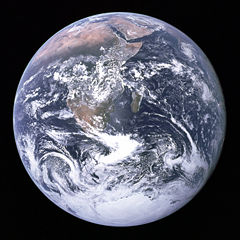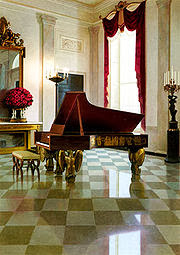In Conversation with Marta Topferova
Around 2005-06, I heard vocalist and cuatro player Marta Topferova giving a radio interview in Seattle. After the interview, I acquired her recording, La Marea and I fell in love with its blend of old style Latin American music with a modern sensibility. That following Valentine’s Day I saw Marta with her trio at Jazz Alley (Seattle), and I felt swept away by the South American cuatro and Marta’s alto vocals. And I wasn’t the only one—many audience members stayed after the concert to meet the performers.
Later with the release of her second recording on World Village, Flor Nocturna, again Marta supplied her listeners with a collection of thoughtful songs performed in a “chamber ensemble” format. Some of the material felt melancholy, but so were the times in which I found myself listening to the recording.
Now, Marta awaits the release of her third World Village recording, Trova (see review below), which celebrates music of the Caribbean and South America. The songs tinged with poetic reflection, Latin percussion, cuatro, guitar, accordion, très (Cuban lute), and violin again speak of the times in which we live.
I caught up with Marta via e-mail for a conversation about the new album, Trova. While the music itself possesses a warm tropical feel, the poetry speaks directly to the times in which we live. Can we heal the world through our music and words?
WME: When I saw the title of your new CD my thoughts immediately went to the Cuban trova tradition and of course to the poetic troubadours from Spain in which Cuban trova found its roots. Now, you had lived in Cuba at one point where you studied Cuban music so is this where you found inspiration for this new album?
Marta Topferova: I visited Cuba 10 years ago and lived in Spain for 6 months in 1993. But most of my knowledge of Latin American music comes from playing with Latin American musicians in New York and my own studies throughout the years. For Trova, I wanted to go for a more upbeat concept and highlight Caribbean influences such as the Cuban son, bolero, Puerto Rican bomba, etc. I was always fond of the Cuban très and was lucky to find a très player (Aaron Halva), who knows the trova tradition very well, but is a versatile musician who can play many other rhythms and styles on the très. I also wanted to include some songs with 'coros' which are such a strong part of Latin American music.
WME: Trova acts as a departure for you from the Venezuelan-Colombian sound, even though half of this recording features the cuatro-based music. The violin, and bass is still present, but you have added more percussion, a très (traditional Cuban lute), and accordion, as well as, you bringing in acoustic guitar.
So what was your musical journey between Flor Nocturna, 2006 release to this new album?
MT: When I produced my last release, Flor Nocturna, I was working with a more chamber concept, partly because when I started touring, we played mostly in trio settings where I accompanied myself on cuatro along with just bass and violin or flute. I love this kind of subtle sound, but I found that I wanted to bring in a more energetic aspect to the performances, so I formed a group where percussion and coros play an important role.
WME: Poetry, both yours and other poets play a central role on Trova as you would expect. Would you like to comment on some of the themes, which delve into spirituality, nature, love and transcendence? (The Meadow, La Pradera, reminds me of Pablo Neruda’s poetry with its combination of natural beauty and human longing, despair).
MT: I like to write about many themes. The opening song is called Juligán or Hooligan, which is about a homeless guy. Homelessness is an unfortunate phenomenon we see frequently in New York City. My other songs are often inspired by nature or mythological symbols such as the song Vuelo de Cigueña or Flight of the Stork. I also like to share thoughts about society at times - for example in Madrugada (Dawn), I write, "What has happened to our power (as humankind), that has threatened what should be loved most." What I mean by that is that while our presence as a society in the world has been remarkable, it also brings with it serious difficulties such as global warming, pollution, extinction for many species.
Humanity is facing terrible dangers – commercialism is dominating more than ever, and we are not doing enough to care for nature, the poor and the vulnerable. This may sound old fashioned, but I am finding too much violence and vulgarity in our mainstream culture. So, I suppose I strive to offer a sort of refuge with my music, a place that is imaginitive, nourishing and beautiful.
WME: I remember reading in your biography from years ago that you studied the music of Spain, Cuba, and South America. How did this love of Latin and Spanish music start for you? I remember reading that you were a child living in the Czech Republic and that your family had Hispanic friends that drew you into Latin culture. Did this connection lead you in the direction of Latin American music?
MT: My first introduction to Latin American music was when I was 6 years old. My parents, both actors, worked with some Chilean friends who immigrated to Czechoslovakia in the 1970s. They gave my parents a collection of LPs by Inti-Illimani, a Chilean folkloric group who play music of the Andes. I fell in love with these records and played them over and over.
But there was no other Latin American music to be found behind the iron curtain back then. So the opportunity for me to explore my passion for this music didn’t come until I immigrated to the U.S. in 1987 with my mother and sister. It was in my adolescence in the U.S., where I came in contact with other immigrants like myself that my interest in the Spanish language and culture took off. I also finally had a chance to seek out a much broader variety of music.
WME: What comments would you like to make about the production of Trova, the new instrumental arrangements and new musicians on board for this album?
MT: Trova was recorded in a studio near Prague after a European tour. I did the arrangements for the album before we went on tour, but having a chance to play ten shows in a row and work on the music before recording made a big difference. The studio, "Sono" and engineer Michal Vaniš, turned out to be fabulous. We recorded the whole thing live in the main hall, which had amazing acoustics. I think the album has a very warm and organic sound, like older recordings.
The studio is an old farmhouse with a hotel and restaurant attached, so we stayed and ate there during the sessions. This created such a great and relaxed atmosphere for the making of the record. I also know each player quite well and the chemistry between the band members is great. The bassist (Pedro Giraudo) and percussionist (Neil Ochoa) have been playing with me for about nine years. The violinist (Roland Satterwhite) has toured with me a lot in the last three years. Aaron Halva on très and accordion is the newest addition. Aaron and I only started playing together about a year and a half ago, but I knew him on the New York scene for years and knew his musical tastes were very close to mine.
WME: Since you combine spiritual poetry with music, do you find composing and performing music to be a healing force in your life?
MT: Yes, music is a healing force in my life. Sometimes one forgets that – when one gets all caught up in the logistics that go into planning concerts, tours, and trying to make a living doing it. But then you have moments when you realize how much music means to you and the power it can have to uplift others.
WME: Finally what musicians, living and dead inspire you as a musician?
MT: My main inspiration has come from Camarón de la Isla, Paco de Lucía, Rafael de Utrera, Atahualpa Yupanqui, Mercedes Sosa (who passed away just recently), Guillermo Portabales, Los Compadres, Eliades Ochoa, Celia Cruz, Joao Gilberto, Antonio Carlos Jobim, Vinicius da Moraes, Nereu Mocoto & Swing (a record called Power Samba), Lucía Pulido, Juan Carlos Formell, Zuzana Lapcikova, The Beatles, Led Zeppelin, Jimi Hendrix, Miles Davis and many more…
World Village




Comments
Post a Comment